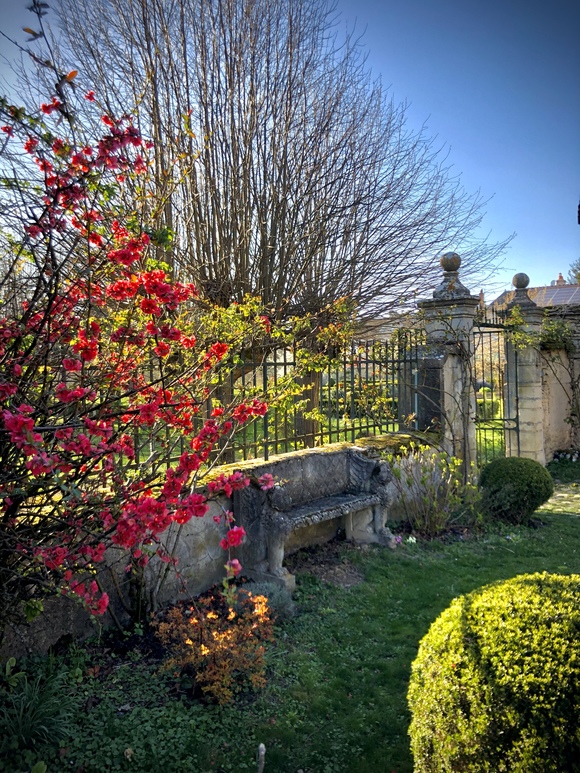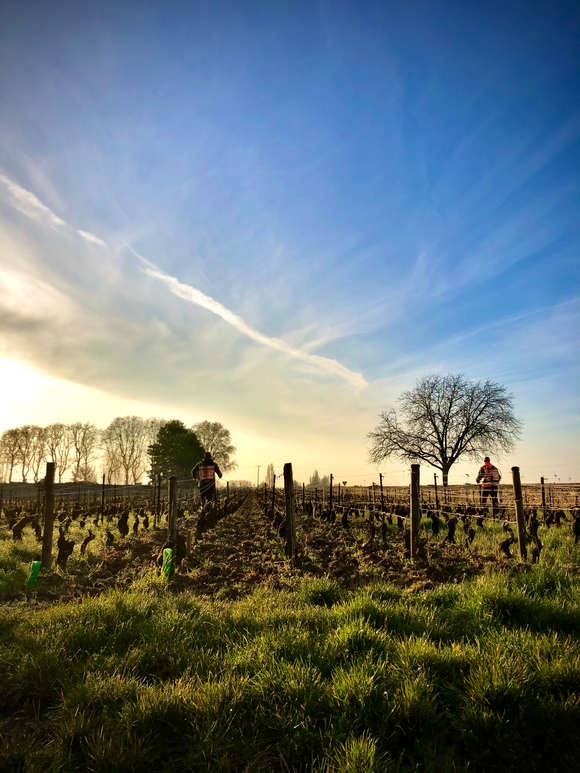Domaine Rougeot Père & Fils from Meursault was founded by Henri Rougeot and is now run as a 4th generation family business by Pierre-Henri together with his father Marc. The farm covers 12.6 hectares of vineyards and produces around 60% of white wine and 40% of red wines.
The narrative of family tradition and dedication to wine is often the bracket that binds Burgundian businesses together over centuries. Thus, the Rougeot name has also been mentioned in connection with viticulture for nine generations. It was Henri Rougeot, however, who only four generations ago put his money where his mouth is and founded the Domaine Rougeot Pére & Fils, which has been operating under the same address since then with a clear line of succession.
Click here for the wines of the Domaine Rougeot, Meursault
The Domaine building and part of the surrounding vineyards were once owned by the Hospices de Beaune, which grew fruit on this site. Henri's son Hubert, a busy construction entrepreneur and mayor of Meursault for 25 years, had the trees cleared and Chardonnay planted instead. Since this land was not approved for viticulture, the wines may only be marketed as Bourgogne Côte d'Or, although this site is located in the middle of Meursault, not far from the great Les Chevaliers site, on the best soils.

Marc and Pierre Henri Rougeot 
In the cellar of Rougeot Père Fils
During the 1960s and 1970s, the domaine took on its present form under Hubert Rougeot: After taking over the business from his father Henri, he expanded and acquired vineyards in Volnay and Pommard, while his brother was able to buy the Premier Crus Charmes and Monthélie.
Added to this was the cultivation of the Domaine de Meursault land of an additional 50 hectares. There was a lot to do, but Hubert was a better businessman and busier entrepreneur than a winemaker, and so he handed the business over to his son Marc. Like his father, Marc was not a passionate winemaker, but rather saw wine as a means of making a living. So in the mid-90s, he began to develop his wines as a negociant with fixed contracts for French supermarket chains. The Domaine Negocé continued to produce wines until 2016, when his son Pierre-Henri dared to make a radical break, left the business and lost 85% of his market in one fell swoop. At this point, the story picks up speed.
Pierre-Henri Rougeot attended the Lycée Viticole in Beaune for two years before joining the Domaine de Montille. There he worked in the cellar as well as in the vineyards and developed a passion and dedication to wine that he always missed in his father and grandfather. Encouraged by his father to look at the market in all its facets, he then moved to a merchant and then to an exporter. He was then employed for a few years by a regional cooper, where he worked part-time until 2019.
Pierre-Henri has been fully responsible for the ageing of the wines since 2010. His father quickly realised that his son was driven by great passion and even greater talent and willingly left the cellar to him. And since, in Pierre-Henri's opinion, there can be no good wine from bad soils, he dared to take his first steps towards organic farming as early as 2012. The decisive factor for this were some sites that repeatedly had problems with Premox and whose wines seemed unbalanced and inharmonious despite respectable origins.
According to Pierre-Henri, the organic approach brought a significant improvement in qualities, and so the course was finally set: He terminated the cooperation with the supermarkets with the 2016 vintage. The previous type of wines and the prices achieved in this market segment were simply below the possibilities offered by these excellent historic terroirs. Moreover, they were far below Pierre-Henri's own expectations as a winemaker.
Hard hit by the spring frosts, the harvest in 2016 was correspondingly small, but the quality was respectable and for the first time allowed the vines to be vinified according to their own quality standards. This circumstance only seemed to confirm the decision to take this existential step, so that Pierre-Henri and Marc Rougeot logically registered the farm for conversion to organic farming. Since the 2020 vintage, Domaine Rougeot Pére & Fils has been fully certified organic and has also been in the process of biodynamic conversion since the beginning of 2021.
The ageing process at Rougeot
In the vineyard, all work is done by hand, tractor journeys are reduced to a minimum to prevent soil compaction. No synthetic pesticides are applied.
The grapes are strictly hand-picked into small crates and relatively little happens in the cellar. The Pinot grapes are again sorted by hand and are then placed intact and unstrained in small vats. This is followed by spontaneous fermentation with their own yeasts and careful ageing without the addition of sulphur for the maximum transparent expression of origin and terroir. Each vineyard is vinified separately, followed by two or three pigeages for gentle colour and tannin extraction.
Chardonnay and Aligoté are pressed or crushed together with the crests and then kept in larger barrels at 10°C until the coarse lees have settled. The clear must is then moved to the barrels for fermentation. Both white and red wines are aged exclusively in 228-litre Burgundy barrels with a deliberately low proportion of new wood for 12 to 20 months without battonage.
For the red wines as well as for his whites, Pierre-Henri initially refrains from adding sulphur. This allows him to fill some barrels with minimal sulphur addition or completely without SO2, depending on the development. In this case, the wines are marketed with white diagonal labels under the Lieu-Dits name. The wines with added sulphur appear with the regular, classic label. All wines are bottled unfined and unfiltered the following March/April.
Text and wine expertise: Sebastian Bordthäuser



